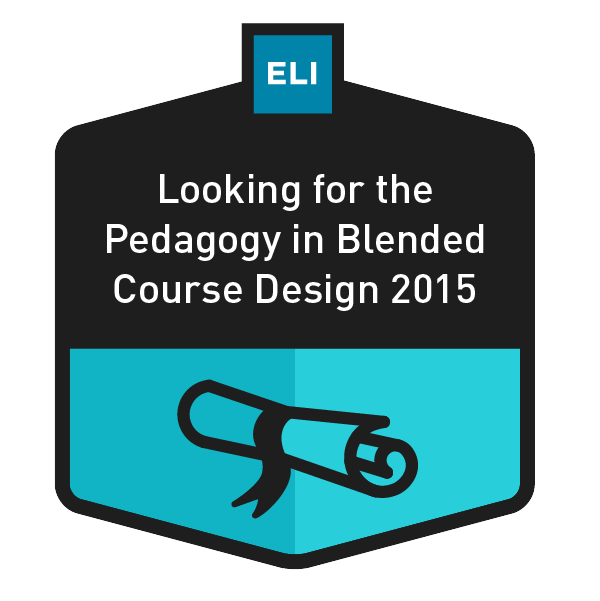Looking for the Pedagogy in Blended Course Design
The proliferation of blended/hybrid initiatives and resources is heartening and furthering a delivery model that is reaching maturity. However, there is still much to be examined about what organizations promote as models for designed blended courses and how these models are enacted by practitioners. Research in this area has historically focused on learner traits, grades, faculty/learner levels of satisfaction, and/or levels of learner engagement (see Dzuiban, Hartman, and Moskal 2004 and Nagel 2009). But blended learning is more than a simple "flip" of the classroom because it requires careful planning and cautious implementation and may even be transformative for both learner and instructor.
This session will present the findings from a series of studies examining blended best practices, pedagogical practices, and learner preparedness. There is indication that while alignment through an integration of online and face-to-face components is a priority, in actuality courses are location-driven and typically based on pedagogical templates. Most reports advocate a learner-centered approach, yet the variation in approaches indicates that learners must be prepared to adapt to different course designs in ways that acknowledge underlying requirements of the blended format. The presentation topics will include research findings and patterns present and absent across these areas. The session will address mission directly by sharing a range of pedagogical strategies and best practices that are directly aligned with learner success through the axiomatic use of technology to support and facilitate learning.
Learning Objectives
During this course, participants will:
- Identify effective practices that relate to course priorities
- Adopt a layering strategy for organizing the blend
- Utilize a learner-centered approach in the course concept
- Identity and design for needs of the blended learner
NOTE: Participants will be asked to complete assignments in between the course segments that support the learning objectives stated above and will receive feedback and constructive critique from course facilitators on how to improve and shape their work.
Course Facilitator

Patricia McGee is an associate professor at the University of Texas at San Antonio. She has coordinated three graduate programs: Adult Learning and Higher Education, Digital Learning Design, and Instructional Technology. Having directed several technology and teaching grants, she has also worked as research faculty through the Office of Naval Research, Air Force Research Laboratory, and the ELI studying emerging technologies and learning systems in higher education, particularly those used in distributed learning environments. Additionally, she has received a United States Distance Learning Association (USDLA) Gold Award for Online Technology in Higher Education. As a systems appraiser for the Higher Learning Commission and an active consultant, she has a broad view and deep insight regarding institutional strategies. Her scholarly work and workshops focus on strategies for the development of online and blended courses and pedagogically sound applications of digital tools and resources that support learning. Her most recent work examines storytelling as an instructional method and e-collaboration. See her complete C.V.
Additional Resources
- Glazer, F. S. (Ed.) (2012). Blended learning: Across the Disciplines, across the Academy. Sterling, VA: Stylus Publishing, LLC. Halverson, Lisa R., Charles R. Graham, Kristian J. Spring, Jeffery S. Drysdale, and Curtis R. Henrie. "A Thematic Analysis of the Most Highly Cited Scholarship in the First Decade of Blended Learning Research." The Internet and Higher Education 20, 20–34. Inoue, Yukiko, ed. Cases on Online and Blended Learning Technologies in Higher Education: Concepts and Practices. Hershey, PA: Information Science Publications, 2010.
- McGee, Patricia. "Blended Course Design: Where's the Pedagogy?" The International Journal of Blended and Mobile Learning 6, no. 1 (November 15, 2014): 33–55. Picciano, Anthony G., Charles D. Dziuban, and Charles R. Graham, eds. Blended Learning: Research Perspectives. Vol 2. New York: Routledge, 2013.
- Snart, Jason A. Hybrid Learning: The Perils and Promise of Blending Online and Face-to-Face Instruction in Higher Education. Santa Barbara, CA: Praeger, 2010.
- Stacey, Elizabeth, and Phillipa Gerbic, eds. Effective Blended Learning Practices: Evidence-Based Perspectives in ICT-Facilitated Education. Hershey, PA: Information Science Reference, 2009.
- Wang, Fu Lee, Joseph Fong, and Reggie Kwan, eds. Handbook of Research on Hybrid Learning Models: Advanced Tools, Technologies, and Applications. Hershey, PA: Information Science Reference, 2010.
